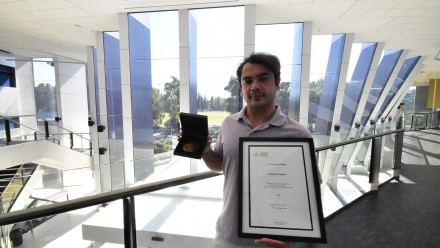Ubiquitination and the functional control of membrane proteins
Professor Sharad Kumar, NHMRC Senior Principal Research Fellow, Co-Director, Centre for Cancer Biology, Research Professor of Cell Biolgoy and Chair of Cancer Biology, University of South Australia, Adelaide, Australia
Ubiquitination is a common protein modification process that is essential for the normal functioning of the cell. This seminar will discuss how ubiquitination regulates membrane proteins, such as the signaling receptors, ions channels and transporters, and the pathophysiological consequences of such a regulatory system. Data will be presented on the role of ubiquitination in iron and salt homeostasis, and in disease. The seminar should be of interest to a wide audience in biomedical sciences, biochemistry, cell biology and physiology.
Professor Kumar is a NHMRC Senior Principal Research Fellow, a co-Director of the Centre for Cancer Biology, a Research Professor of Cell Biology and Chair of Cancer Biology at the University of South Australia. His laboratory has made several seminal contributions to biomedical sciences, including the discovery of Nedd genes, such as Nedd1, a key centrosomal protein required for g-tubulin recruitment; Nedd2 (caspase-2), one of the first mammalian caspase; Nedd4, the first and the founding member of the WW-HECT type of ubiquitin-protein ligase family; and Nedd8, a ubiquitin-like protein involved in a protein modification pathway, now widely known as neddylation. His group with key collaborators also discovered and characterised a several components of the Drosophila apoptosis machinery and defined a caspase-independent, autophagy-depended cell death process. Other discoveries from his team include Ndfips as regulators of the Nedd4 family of ubiquitin ligases, the functions of Nedd4 family of ubiquitin ligases and Ndfips in regulating ion channels and transporters, and an unexpected role of caspase-2 as a tumour suppressor. He continues to study caspase biology and functions, mechanisms of developmentally programmed cell deaths, and the physiological functions and regulation of the Nedd4 family members. He is a Fellow of the Australian Academy of Science (FAA), and the Australian Academy of Health and Medical Sciences (FAHMS). His contributions to science and the profession have also been recognised through the ASBMB Amersham Award, the Ranbaxy Research Award, the ASBMB Lemberg Medal, the FAOBMB Research Excellence Award, the ANZSCDB President’s Medal and appointment as a Member of the Order of Australia (AM).












